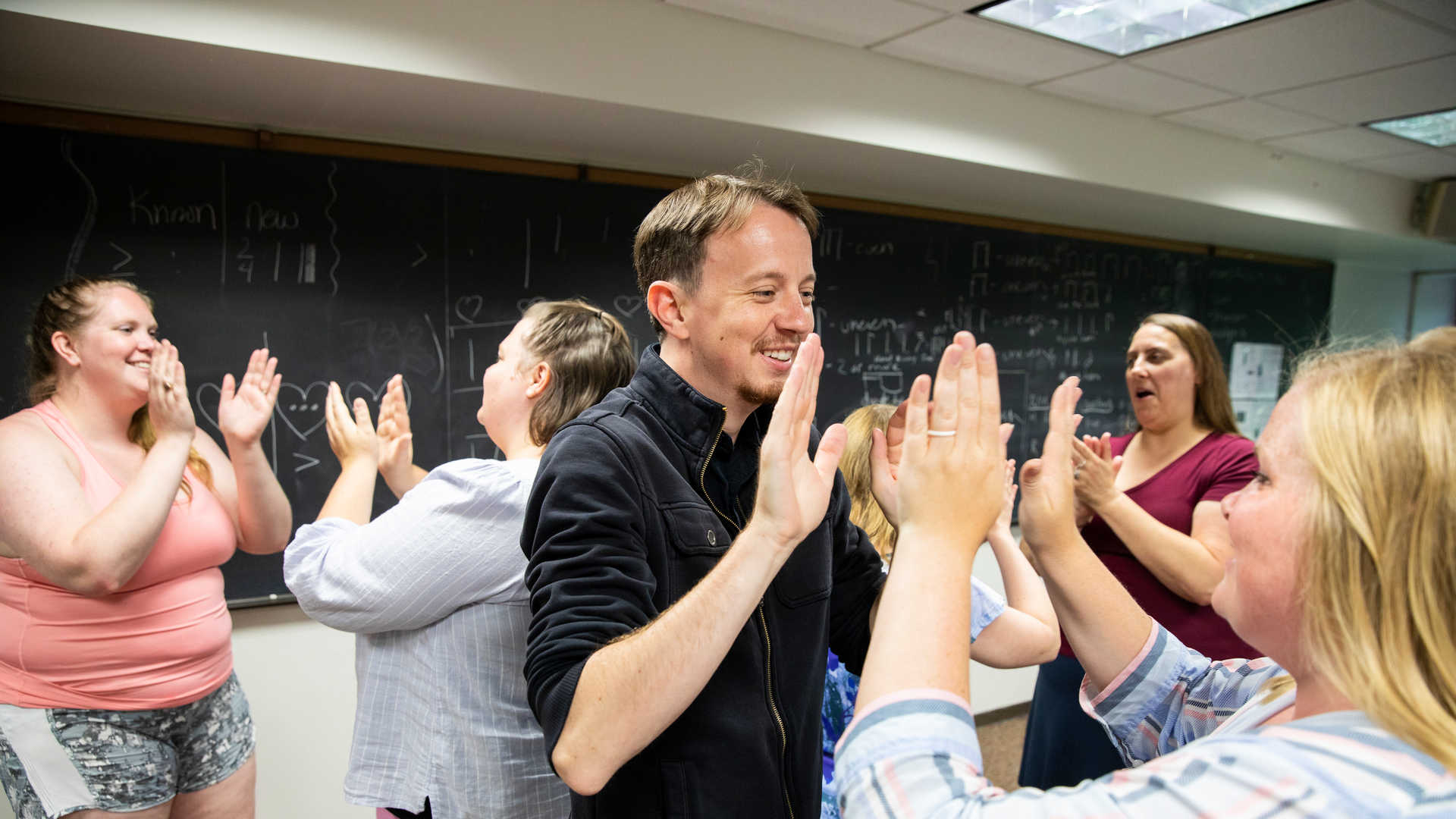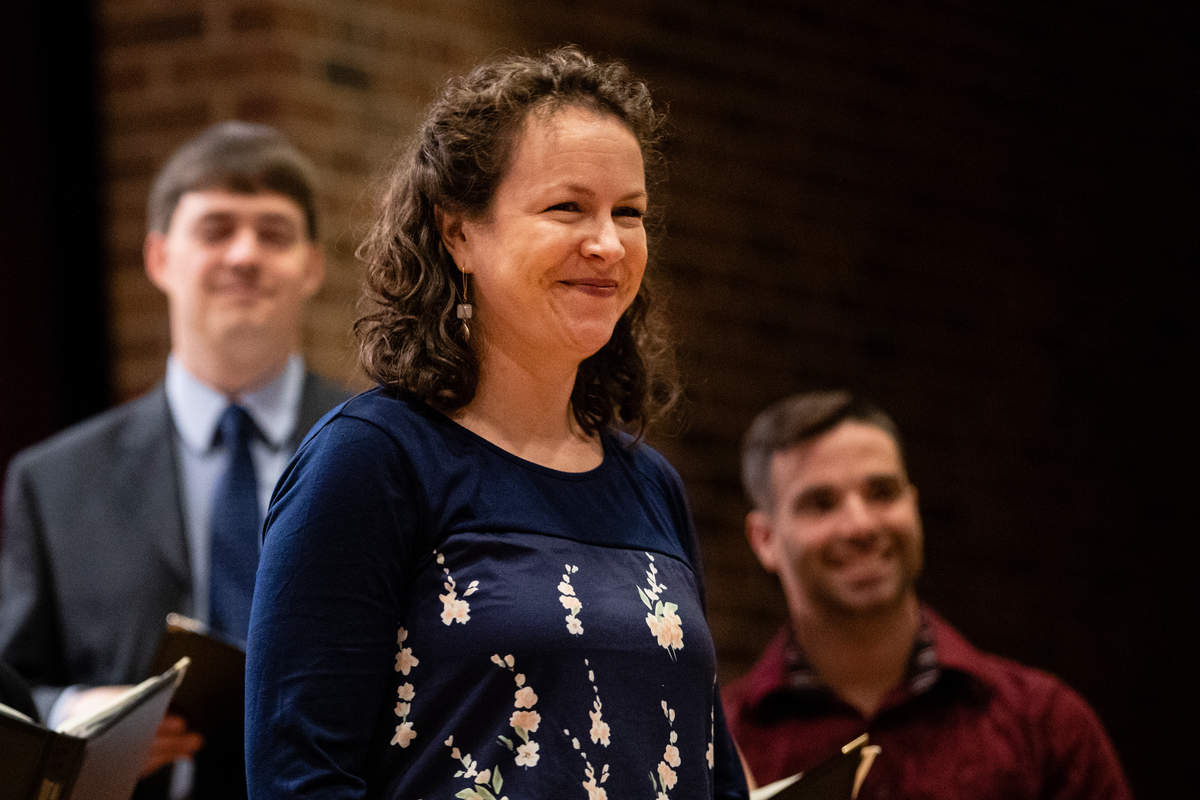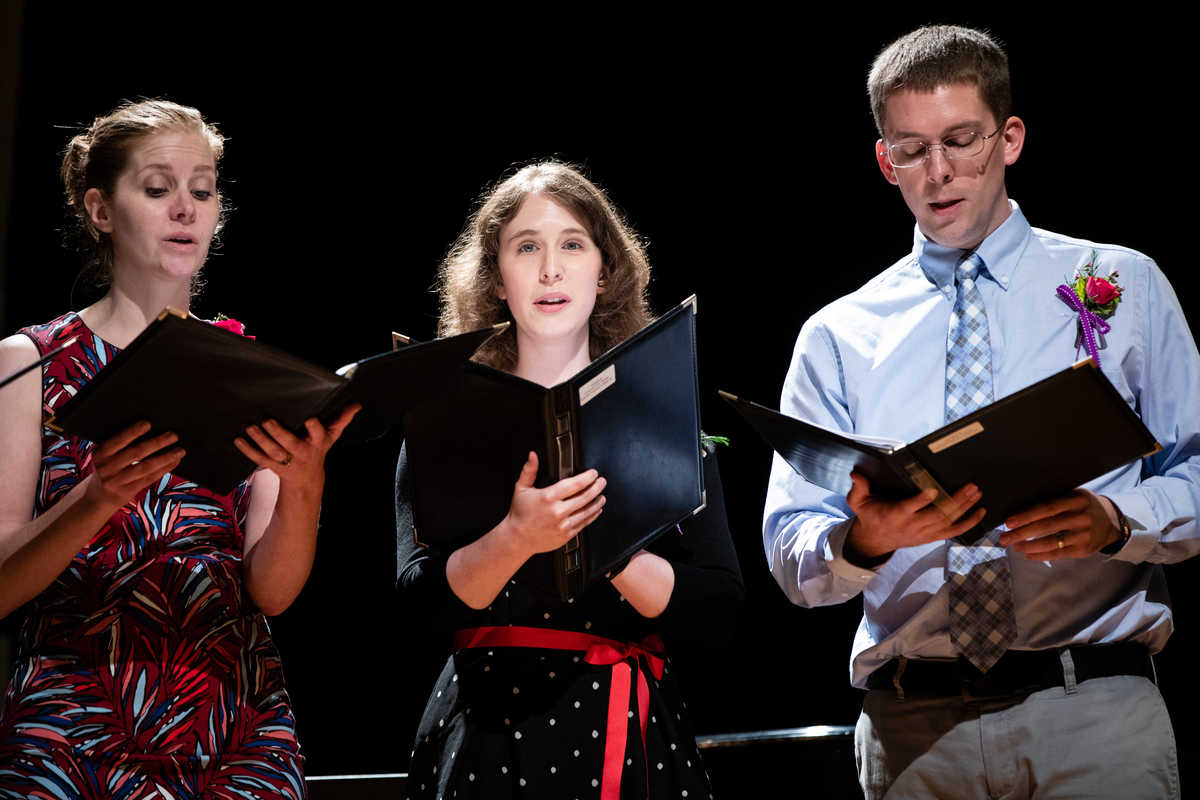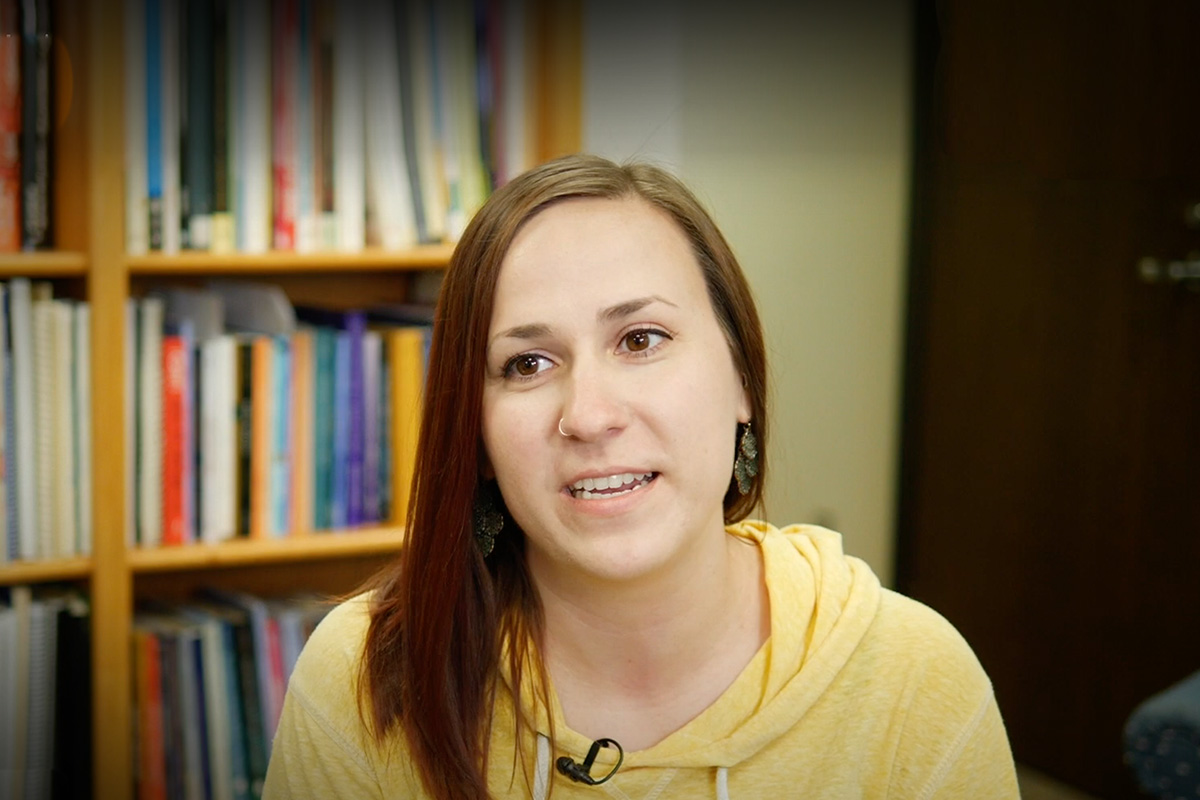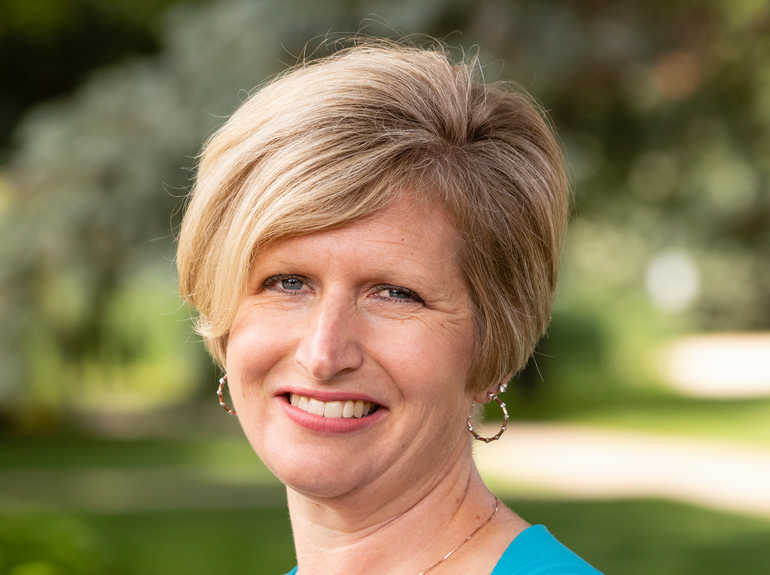
About the MA in Music Education Kodály Concentration
The MA in Music Education Kodály Concentration will teach you a sequential, active music-making approach emphasizing singing, artistry, literacy, reflective music practice and more. The program features a broad range of courses that apply to your work with children using the Kodály approach.
Contact
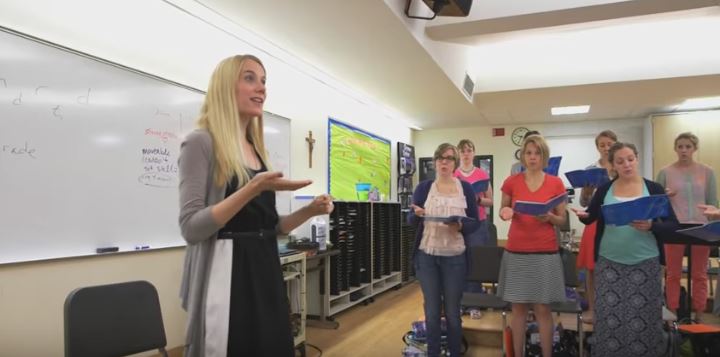
Carrie Krause, MA Student
Born to Teach Music
Doing what she was born to do, Carrie Krause teaches elementary music. Carrie feels St. Thomas has provided her with depth and breadth to be a better teacher.
Curriculum Details
Program Overview
In this music education concentration, students will learn a developmentally sequential, active music-making approach that emphasizes singing, artistry, literacy, authentic music materials, reflective practice and inquiry-based learning for teaching musical concepts and skills. Pedagogic tools include moveable do tonic sol-fa, Curwen/Glover hand signs and rhythm syllables.
The Master of Arts in Music Education curriculum requires 33 credit hours and consists of three elements:
- Core courses covering a variety of topics
- A concentration to develop specific skills
- A master’s thesis or final project to conduct applied research in music education.
Core Courses
Core courses provide opportunities for all master’s students to place their specific skills within a broader musical and educational context. The core consists of 16 total credits, to be completed as detailed below:
Required Core Courses (13 credits)
- GMUS 600 Introduction to Scholarship and Research Methods in Music Education, 3 cr.
- GMUS 601 Teaching and Learning, 3 cr.
- GMUS 608 Foundations of Music Education, 3 cr.
- GMUS 611 Perspectives in Music Theory, 3 cr.
- GMUS 890 Master of Arts Final Project, 1 cr.
And, Choose One of the Following Core Courses (3 credits)
- GMUS 536 Smithsonian Folkways World Music Pedagogy, 3 cr. (offered every Summer)
- GMUS 612 Topics in Music History, Literature and Theory, 3 cr. (offered Fall of even years)
Kodály Concentration Courses
Kodály Concentration Courses (15 credits)
- GMUS 651 Dalcroze Musicianship, 3 cr.
- GMUS 731 Orff Schulwerk Level I, 3 cr.
- GMUS 741 Kodály Level I, 3 cr.
- GMUS 742 Kodály Level II, 3 cr.
- GMUS 743 Kodály Level III, 3 cr.
Kodály Electives
Kodály Electives (2 credits)
- GMUS 518 Teaching Choral Music to Young Singers, 2 cr.
- GMUS 536 Smithsonian Folkways Certification in World Music Pedagogy, 3 cr.
- GMUS 537 Latin American Music, 2 cr.
- GMUS 544-xx Topics in Music Education, credits vary (advisor approval required)
- GMUS 570-592 Performance Studies (30-minute lessons), 1 cr.
- GMUS 606 Realizing Diversity in Music Education, 3 cr.
- GMUS 670 East Asian Music Cultures, 2 cr.
- GMUS 671 African Music Ensemble, 2 cr.
- GMUS 676 Voice Fundamentals, 2 cr.
- GMUS 727 Advanced Choral Conducting, 2 cr.
- Other courses considered for elective credit (advisor approval required)
Other Degree Requirements
- Music Diagnostic Exams
- Oral Comprehensive Exam
Program Overview
In this music education concentration, students will learn a developmentally sequential, active music-making approach that emphasizes singing, artistry, literacy, authentic music materials, reflective practice and inquiry-based learning for teaching musical concepts and skills. Pedagogic tools include moveable do tonic sol-fa, Curwen/Glover hand signs and rhythm syllables.
The Master of Arts in Music Education curriculum requires 33 credit hours and consists of three elements:
- Core courses covering a variety of topics
- A concentration to develop specific skills
- A master’s thesis or final project to conduct applied research in music education.
Core Courses
Core courses provide opportunities for all master’s students to place their specific skills within a broader musical and educational context. The core consists of 16 total credits, to be completed as detailed below:
Required Core Courses (13 credits)
- GMUS 600 Introduction to Scholarship and Research Methods in Music Education, 3 cr.
- GMUS 601 Teaching and Learning, 3 cr.
- GMUS 608 Foundations of Music Education, 3 cr.
- GMUS 611 Perspectives in Music Theory, 3 cr.
- GMUS 890 Master of Arts Final Project, 1 cr.
And, Choose One of the Following Core Courses (3 credits)
- GMUS 536 Smithsonian Folkways World Music Pedagogy, 3 cr. (offered every Summer)
- GMUS 612 Topics in Music History, Literature and Theory, 3 cr. (offered Fall of even years)
Kodály Concentration Courses
Kodály Concentration Courses (15 credits)
- GMUS 651 Dalcroze Musicianship, 3 cr.
- GMUS 731 Orff Schulwerk Level I, 3 cr.
- GMUS 741 Kodály Level I, 3 cr.
- GMUS 742 Kodály Level II, 3 cr.
- GMUS 743 Kodály Level III, 3 cr.
Kodály Electives
Kodály Electives (2 credits)
- GMUS 518 Teaching Choral Music to Young Singers, 2 cr.
- GMUS 536 Smithsonian Folkways Certification in World Music Pedagogy, 3 cr.
- GMUS 537 Latin American Music, 2 cr.
- GMUS 544-xx Topics in Music Education, credits vary (advisor approval required)
- GMUS 570-592 Performance Studies (30-minute lessons), 1 cr.
- GMUS 606 Realizing Diversity in Music Education, 3 cr.
- GMUS 670 East Asian Music Cultures, 2 cr.
- GMUS 671 African Music Ensemble, 2 cr.
- GMUS 676 Voice Fundamentals, 2 cr.
- GMUS 727 Advanced Choral Conducting, 2 cr.
- Other courses considered for elective credit (advisor approval required)
Other Degree Requirements
- Music Diagnostic Exams
- Oral Comprehensive Exam
Our Alumni
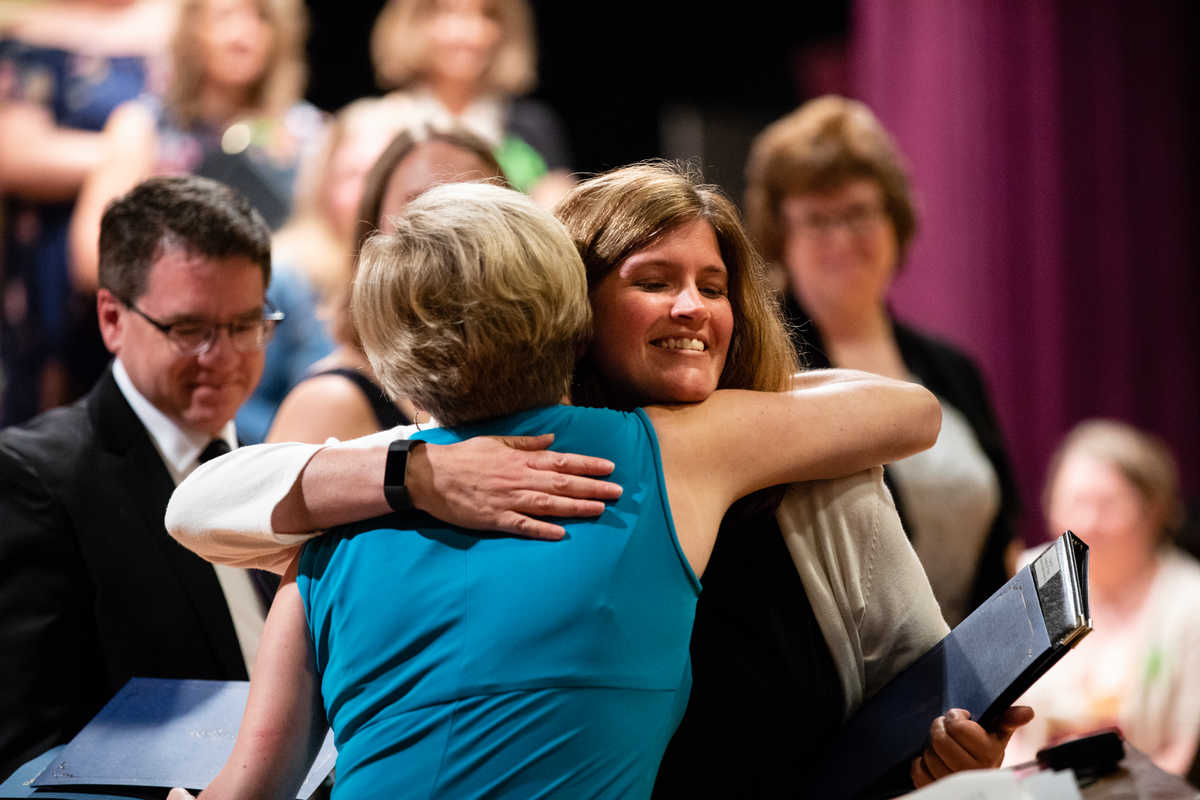
Annual Kodály Celebrations
Kodály graduate students and faculty conclude their course work with celebrations on their last day of classes. They gather for breakfast and skits in the morning and perform a choral concert in the afternoon.
Faculty


Daniel LeJeune

Casey Barker

